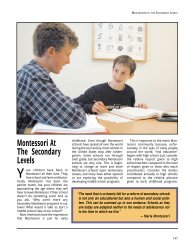Tim Seldin & Paul Epstein Ph.D. An Education for Life
Tim Seldin & Paul Epstein Ph.D. An Education for Life
Tim Seldin & Paul Epstein Ph.D. An Education for Life
Create successful ePaper yourself
Turn your PDF publications into a flip-book with our unique Google optimized e-Paper software.
PARENTS’ QUESTIONS &ANSWERS<br />
Brief <strong>An</strong>swers to Questions Parents Often Ask<br />
Why do Montessori classes group<br />
different age levels together?<br />
Sometimes parents worry that by having<br />
younger children in the same class<br />
as older ones, one group or the other<br />
will be shortchanged. They fear that<br />
the younger children will absorb the<br />
teachers’ time and attention, or that<br />
the importance of covering the kindergarten<br />
curriculum <strong>for</strong> the five-year-olds<br />
will prevent them from giving the<br />
three- and four-year-olds the emotional<br />
support and stimulation that they<br />
need. Both concerns are misguided.<br />
At each level, Montessori programs<br />
are designed to address the developmental<br />
characteristics normal to children<br />
in that stage.<br />
▲ Montessori classes are organized<br />
to encompass a two- or three-year<br />
age span, which allows younger<br />
students the stimulation of older<br />
children, who in turn benefit from<br />
serving as role models. Each child<br />
learns at her own pace and will<br />
be ready <strong>for</strong> any given lesson in<br />
her own time, not on the teacher’s<br />
schedule of lessons. In a mixedage<br />
class, children can always find<br />
peers who are working at their current<br />
level.<br />
▲ Children normally stay in the<br />
same class <strong>for</strong> three years. With<br />
two-thirds of the class normally<br />
returning each year, the classroom<br />
culture tends to remain<br />
quite stable.<br />
▲ Working in one class <strong>for</strong> two or<br />
three years allows students to<br />
develop a strong sense of community<br />
with their classmates and<br />
teachers. The age range also allows<br />
especially gifted children the stimulation<br />
of intellectual peers, without<br />
requiring that they skip a<br />
grade or feel emotionally out of<br />
place.<br />
Contents<br />
Why Do Montessori Classes Group Different Age Levels Together? 237<br />
Why Do Montessori Classes Tend To Be Larger Than Those<br />
Found in Many Other Preschools? 238<br />
Why Do Most Montessori Schools Ask Young Children to<br />
Attend Five Days a Week? 238<br />
Why Is Montessori So Expensive Compared to Other Schools? 238<br />
Why Do Most Montessori Schools Want Children to Enter at Age Three? 238<br />
How Can Montessori Teachers Meet the Needs Of So Many<br />
Different Children? 238<br />
Why Is A Montessori Classroom Called a “Children’s House?” 239<br />
What Do Montessori Schools Mean by the Term “Normalization?” 239<br />
Is Montessori <strong>for</strong> All Children? 239<br />
Is Montessori Opposed to Homework? 240<br />
Is Montessori Unstructured? 240<br />
Are There <strong>An</strong>y Tests in Montessori Programs? 240<br />
How Do Montessori Schools Report Student Progress? 241<br />
Will My Child Be Able to Adjust to Traditional Public or<br />
Private Schools after Montessori? 241<br />
Is Montessori Opposed to Competition? 241<br />
Is It True that Montessori Children Never Play? 242<br />
Is Montessori Opposed to Fantasy and Creativity? 242<br />
What’s the Big Deal about Freedom and Independence in Montessori? 242<br />
What If a Child Doesn’t Feel Like Working? 242<br />
What about Children with Special Needs? 243<br />
Wasn’t Montessori First Developed <strong>for</strong> Children with<br />
Severe Developmental Delays? 243<br />
Is Montessori Effective with the Highly Gifted Child? 243<br />
Isn’t Montessori Elitist? 243<br />
Does Montessori Teach Religion? 243<br />
229




